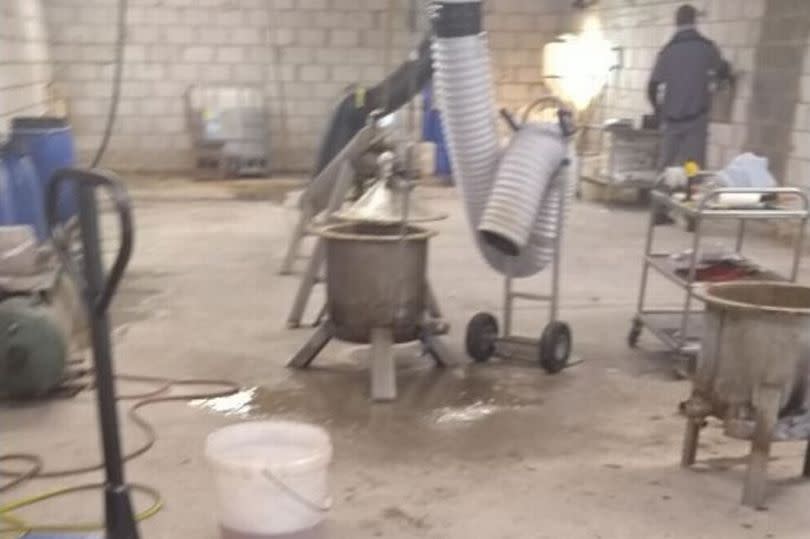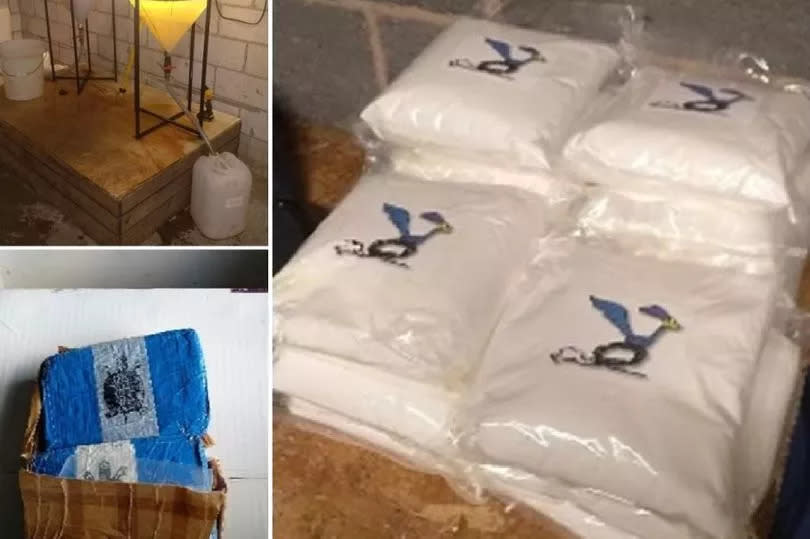EncroChat dealer 'Jesse Pinkman' ran multi-million pound amphetamine farm

A sophisticated EncroChat operation which produced millions of pounds worth of amphetamine at a remote cottage was led by a drug dealer who used a Breaking Bad themed handle.
The plot included criminals from Merseyside, West Lancashire and Yorkshire, who used the encrypted phones to communicate and cast an elaborate network of supply chains across the country. But the gang's illicit business was uncovered following the European authorities' hacking of EncroChat in April 2020.
The gang's members have since been jailed for a staggering combined total of more than 200 years. But before then, the operation was extremely lucrative, making the gang millions as they transported their amphetamine across the UK. After the latest member of the gang was jailed this week, the ECHO has taken a look back at the operation taken down by a multi-force probe.
READ MORE: When Louise came to I had to tell her the grim news about our baby
READ MORE: 'Fatal' £10 drugs crisis young lads are falling victim to on Liverpool streets
The gang's encrypted phones gave the conspirators a sense of invincibility due to their assurances that what they were doing was completely clandestine. However, they ultimately proved to be their downfalls. Following the hack, UK law authorities including the National Crime Agency (NCA), Merseyside Police and North Wales Police were handed the evidence which showed the extent of the conspiracy.
A series of messages alluded to a laboratory on the outskirts of Chester being used to produce amphetamine. Officers from Merseyside Police and North Wales Police later discovered this factory on Deeside Lane in the Sealand area of the city. A court previously heard the North Wales probe was codenamed Operation Bluesword and work began to carry out surveillance on the cottage.
However, on or about May 1 some of the gang, who were "undoubtedly paranoid about being detected by the police, identified the presence of North Wales surveillance vehicles/officers who had recently begun surveillance around Wood Cottage". The site was "abruptly shut down".
Undeterred, the organised crime group (OCG) continued its attempts to produce amphetamine by moving the supplies to a storage unit in an Aintree industrial site known as the Box Works.
Communications detailed arrangements for the supply of a total of 900 litres of amphetamine oil and between 780kg and 1,000kg of amphetamine sulphate paste. The outfit supplied customers as far afield as Dundee, Glasgow, Neath and Newcastle.
A North Wales Police officer estimated the lab converted 2.6 tonnes of raw chemicals into controlled drugs over a three month period, which was estimated to be worth over £1m. He said: "Such was the scale of the production enterprise; the raw materials were moved onsite with plant machinery and HGVs involved in the logistics."
Various court proceedings didn't explain why the operation focused on amphetamine compared to more popular drugs like cocaine. Two of the key advantages might have been the cost and the accessibility to produce. At £900 for a two kilo pack, the drug is a fraction of the cost of cocaine, which can be priced over £30,000 per kilo. The drug can also be produced domestically using accessible chemicals, instead of being imported from South America and Europe.
However, complex chemical processes are required and it is a gruelling process for those prepared to do it. This is even more true of injectable amphetamine, which allows users to feel the drug's effect quicker - and which the gang focused on. Honour Judge Denis Watson KC, who presided over the various cases at Liverpool Crown Court, said: "The manufacture [of amphetamine] was on a large, commercial scale and involved complex processes and specialist apparatus. It required patience, skill, determination, hard work and sourcing and obtaining specialist chemicals. It was a long process and a hazardous one.
"None of those involved in the manufacture were trained chemists, but the rewards were sufficient for those involved to overcome their absence of training so that high quality, injectable amphetamine was then distributed all over England." He described the scale of the operation as "vast".
The work was time consuming and complicated. EncroChat messages described the harshness of the effects of the chemicals and the intensity of the labour. However, they appeared to be committed to not cutting corners. Paul Mount, one of the gang's top men along with Anthony Saunderson and Darren Owens, particularly became experienced in utilising the Leuckart method, a chemical process, to produce amphetamine - and he and others discussed honing the process to ensure their product met their customers’ standards.
When one dealer in Manchester complained about a batch of drugs which set in the needles of users, Mount and Saunderson were at pains to figure out how the mistake happened - and later settled on only using certain chemicals to ensure it would not happen again.
Their commitment to perfecting the production of amphetamine didn’t dampen their enthusiasm for trading in other drugs - and indeed some of the gang were later found to have traded in cocaine and heroin. Despite this, amphetamine remained at the core of their business - and it was a decision which was profitable. Trading to cities across the UK, their profits were estimated to have reached £6m.
Saunderson, Mount and Owens undoubtedly directed the gang's operations, with the former cockily using EncroChat handles named after Breaking Bad character Jesse Pinkman and Sopranos actor James Gandolfini. Mount went by the handle "Nova-Club" while Owens went by "PaperJaguar" and "PierreWhite".
But they also relied on an elaborate network of co-conspirators. Kieron Harley (BigWaiter) and Lee Eccles worked for 10 hours a day producing the dangerous chemicals in the lab. Stephen Shearwood, who used the handle "Octo-ice", Michael Pope (Strikingpuma) and David Kelly (Atom-game) took on various roles in the operation including transporting drugs and cash around the country and storing chemicals. Stefon Beeby was also involved in the production and supply of amphetamine from the cottage, and when he was arrested, his brother Mark became involved in the illicit business and took over control of the "ParkPlum" EncroChat handle.
Their illicit operations likely continued for so long because they had legitimate businesses they could use as cover to move drugs and the chemicals needed to produce them, even during the covid lockdown at the start of 2020. Owens ran Eurowindows, a double glazing business in Huyton, and used its vehicles to transport supplies across the country.
Beeby, nicknamed “Halifax” after the West Yorkshire town where he was based, had a lorry which was sometimes used to move drugs. Yet a majority of the transportation fell heavily on the shoulders of Shearwood, nicknamed "the jockey".

After the gang became suspicious they moved their supplies into the Box Works storage facility. They established another factory, the location of which is still unknown to this day but was suspected of being in the Bootle area, but with the law enforcement net closing in, the gang started to become jumpy.
Saunderson and Mount attempted to arm themselves with weapons, while Adam Ashton seemed to become aware that EncroChat was hacked before it became public knowledge in June. Ashton, who was originally from Yorkshire and acted as a go-between before the Merseyside-based members of the OCG and the Beeby brothers, sent another user a message the previous month which said: "These phones aren't safe anyone. Fact. I'll show you what I've just seen and heard. He subsequently fled the UK to Spain via ferry.
After the EncroChat hack was made public, NCA officers moved in and raided multiple locations, including the Box Works. Saunderson, Owens, Mount and most of their associates were arrested. Ashton was ultimately detained on a European arrest warrant on September 21 2022, latterly being returned to the UK on August 4 last year.
While some of the gang pleaded guilty once charged by the CPS, it took two trials to convict the rest. The efforts of the group to make their amphetamine injectable may have given an edge to their business - but it has had devastating consequences for the gang’s members since their arrest.
Amphetamine is a class B drug and convictions for producing or supplying it normally attract lower jail terms than drugs like cocaine and heroin. However, under UK law, changes made to any class B drug to make it injectable move it upwards into the class A category. That, combined with the astounding quantities the gang dealt with, is a significant reason behind the lengthy terms many of the gang’s members now face.
Detective Inspector Paul McVeigh of Merseyside Police previously said: "Each of those sentenced took part in the business for at least significant financial gain and although they all played different roles and were involved to differing degrees, they were all aware of the scale of the operation.
“We know the destruction that drug dealing brings to our communities. Those involved in the supply of drugs and use of weapons have no regard for the lives they affect and the harm they can cause, and we are committed to pursuing those involved in serious and organised crime and bringing them to justice."

Saunderson, 42, from Formby, was jailed for 35 years and 38-year-old Mount, of Halsall in West Lancashire, received 34 years. Owens, aged 48 and from Huyton, was handed 24 years.
Thirty-two-year-old Hartley, of Knotty Ash, was given 23 years, 42-year-old Stefon Beeby, from Halifax, was jailed for 15-and-a-half years and 33-year-old Eccles, of Maghull, was locked up for eight years and nine months.
Shearwood, 38 and also from Maghull, was jailed for 14 years and four months. Forty-four-year-old Kelly, of Ormskirk, was handed 15 years and three months. Pope, 35 and of Maghull, was given 17-and-a-half years. Twenty-nine-year-old Connor Smith, from Maghull, was jailed for seven years and 11 months.
Mark Beeby, 46, was then handed 10-and-a-half years last month. Ashton was jailed for eight years and four days, taking into account the time he served in Spain before his extradition.
Don't miss the biggest and breaking stories by signing up to the Echo Daily newsletter here.

 Yahoo News
Yahoo News 
